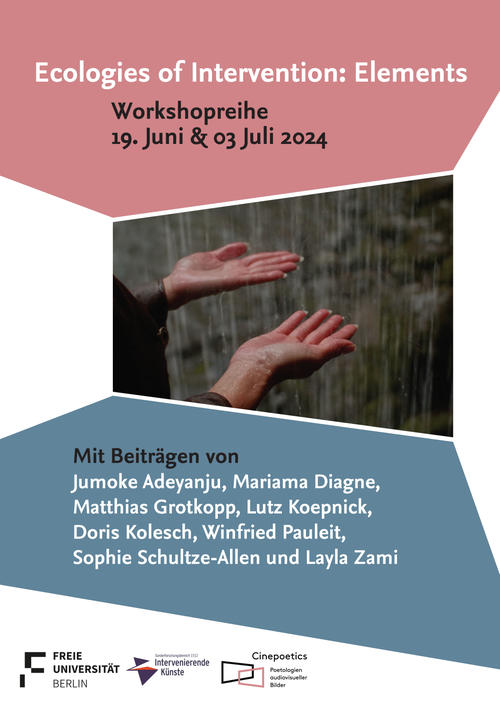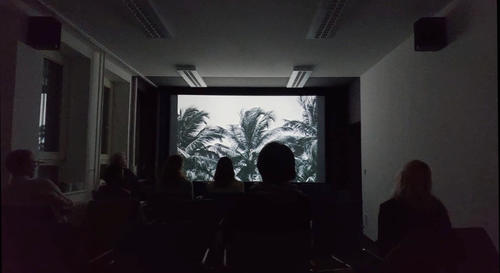Ecologies of Intervention: Elements Part 2
03.07.2024 | Workshop des CRC 1512 "Intervening Arts" and the Cinepoetics group with Mariama Diagne and Lutz Koepnick
The second part of the workshop began with a screening of C.J. 'Fiery' Obasi’s MAMI WATA (NG/F/UK 2023), followed by a lively discussion about the participants' initial thoughts on the film. Focusing on the figure of Mami Wata, the group used the element water as a starting point to discuss its' omnipresent space of interaction and transition, asking questions about its localizability within the shown world, as well as its life-taking and life-giving abilities. To elaborate on this, Mariama Diagne gave insights into her ongoing research of water and the various depictions of Mami Wata from an interdisciplinary point of view. Following Diagne's research, the different modes of the textuality of the water in the film may underline the rhythmicality of the film's visuality, emphasizing its in-between-ness. The depiction of Mami Wata therefore shifts from a passive reception of knowledge of a medium towards an active and intermediary character.
The participants also mentioned aspects of timelessness, in which temporal insertions lead to different levels of reality that may lead viewers to combine such different temporal layers. However, this is connected to questions regarding the visible and invisible. There are multiple aspects of knowing and seeing, as well as being unseen or observed, as the discussion showed. A binary understanding of land and water, lightness and darkness, moon and sun, as well as the gendered aspects of the film follow such premises of visuality. Furthermore, the group elaborated on the shifting areas of tension regarding the depiction of gender, heteronormativity and queerness in Mami Wata.
After the lunch break, Lutz Koepnick introduced his current research project, linked to his podcast series "Art of Interference". Based on artistic practices, his scholarly podcast deals with different presentations of climate change and possible alternative scopes for action, based on modes of interference.For Koepnick, the format of the podcast itself expands the modes in which the displayed information is perceived, demonstrating new ways of perception. Expanded listening, as he put it, is an extension of the perception, expanding the dialogue between art, science and nature. Contrary to the perception of a negative, deconstructive disruption, interference can be seen as a productive moment that creates space for something new, as well as visualizing invisible processes.Asking questions about modes of listening combined with the possibility to act, he connected his understanding of interference with different approaches to autonomy and freedom. Freedom, thus, may not only be the absence of interference, but the possibility to be able to grasp new spaces for action. This tension of ambiguity and ambivalence between deconstruction and making the new possible is the basis of his research.
Afterwards, the group discussed if art itself can intervene and how the aspects of freedom are linked to ownership and responsibility. Focusing on the empowering modes of resistance and unpredictability, the participants scrutinized new potentials of perception regarding climate crisis as something that can be inscribed in the images, recognizing it as a form of interference itself. Revealing the entanglement between art, nature and science, interference was discussed as an overlapping of habitats, converting different modes of intervention into construction and necessary spaces of negotiation. As a conclusion, the participants connected some aspects of the discussion to the complex representation of power, nature and spaces for action in Obasi's film.

